Learning and knowledge sharing are fundamental to the LHSS Project. We invite you to search LHSS knowledge products and resources for the latest approaches, insights, and learning in the field of integrated health systems strengthening.
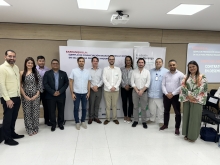
Using performance-based financing, this pilot project represents a significant achievement for the Colombian healthcare system, improving the optimization of financial resources, enhancing key indicators, and notably impacting outcomes, especially for migrant pregnant women—an area receiving special attention from local and national health authorities.
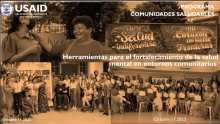
In this webinar, panelists from academia and territorial entities discussed LHSS Colombia response to mental health.
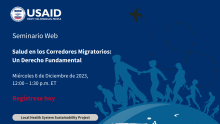
Join LHSS, Doctors without Borders, and the United Nations High Commissioner for Refugees in Honduras as we discuss the relationship between social protection in health and migration corridors in Latin America.
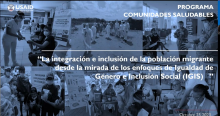
In the webinar, an introduction to Gender Equality and Social Inclusion (GESI) approaches was presented. A panel of experts discussed GESI approaches that ensures the right to health for migrants, returning Colombians, and host communities.
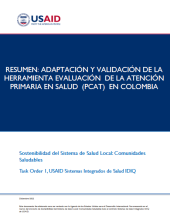
This document describes the interventions implemented by Healthy Communities (LHSS) to evaluate and modify the Primary Health Care Assessment (PCAT) tool for Colombia and create an application to collect and analyze survey data from the tool.
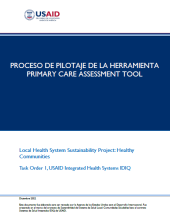
This annex of the report "Adaptation and Validation of the Primary Health Care Assessment Tool (PCAT) in Colombia" serves to adapt and validate the tool (PCAT) to the Colombian context to know and monitor the progress of the implementation of PHC Primary Health Care.
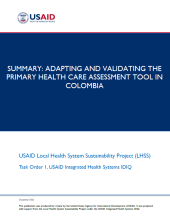
This document describes the interventions implemented by the Local Health System Sustainability Project (LHSS) to evaluate and modify the Primary Care Assessment Tool (PCAT) for Colombia and create an application to compile and analyze data from the tool’s surveys. This tool and its application will help health providers to access data on Primary Health Care (PHC) services, which can be used to improve decision-making and policy formulation within the health care sector. This is an English language summary of the full report, which is available in Spanish.
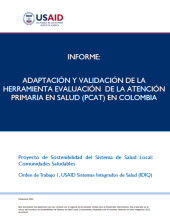
This Spanish report addresses the adaptation and validation of the Primary Health Care Evaluation (PCAT) tool in Colombia. In the context of the reform of the General Social Security System in Health and the Primary Health Care (PHC) strategy, it focuses on the relevance of health education and the implementation of comprehensive service networks.
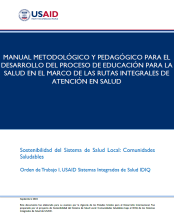
This methodological and pedagogical manual offers guidelines for the development of the Health Education (EpS) process within the framework of the Comprehensive Health Care Routes (RIAS). These routes represent a significant shift in Colombia's public health policy by prioritizing health education.
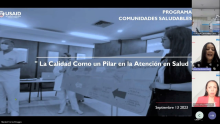
In this space, the experience of the Ministry of Health of Colombia, the quality improvement pathway in the Capital District, and the contributions of LHSS Colombia to health quality improvement were presented.
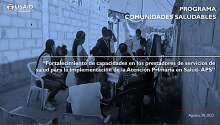
A brief introduction to Primary Health Care (PHC) was presented, along with the tools for PHC implementation developed in collaboration with the Ministry of Health and local health authorities.
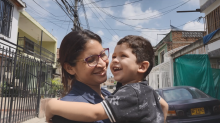
In this video, discover how local organizations in Cali work to strengthen capacity, promote sustainability, and improve access to health information related to the country’s health system.
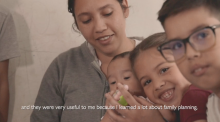
To strengthen capacities and promote equitable access to the Colombian health care system, LHSS and the Healthy Communities program forged several high-impact partnerships in Bogotá. These partnerships focused on supporting the integration process of the migrant population, host communities, and returning Colombians into the country’s health system. This video highlights beneficiaries and partners impacted by this effort.

This video features the efforts of LHSS Colombia grantees to promote inclusion of the migrant population in the health system through a community leadership initiative to improve the provision of maternal health care in the Riohacha District and strengthen the overall capacity of the Colombian health system.
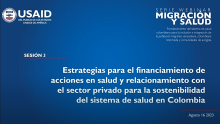
In the session, lessons learned from interventions carried out within the framework of engagement with the private sector for strengthening the health sector were shared.
